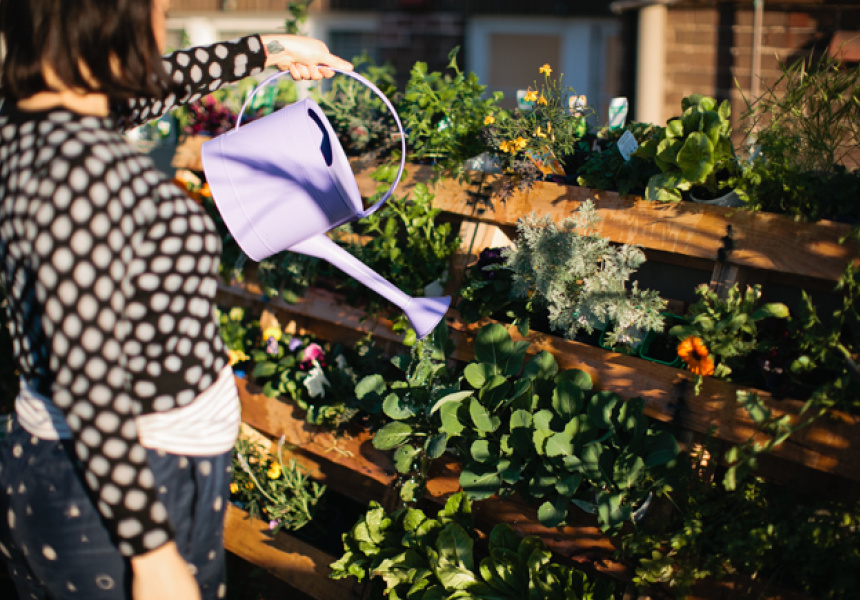MOVING HOUSE? HERE IS FIVE SUSTAINABLE TIPS TO IMPLEMENT FROM THE GET-GO
20/06/2023
Moving house can feel like a chance to start again, particularly when it comes to sustainable living. In partnership with The Canopy, sustainability expert David Mahony talks through some simple changes that can help make a difference when setting up your new digs.

Think of sustainable actions as points on a long scale. Towards one end you’ll find businesses such as property developer Gamuda Land which works with sustainability experts HIP V. HYPE when designing sustainably-minded buildings. At the other end, you’ll most likely find the rest of us.
“It’s all about the choices we make in our day-to-day lives that can have even just small impacts on the environment,” says David Mahony, HIP V. HYPE’s head of Better Buildings. “Making small choices about reducing the energy that we use, reducing our waste, saving water – ultimately having an impact on the planet and the changing climate.”
While anyone can make sustainable change, moving house is a good time to start. It can be a bit like a New Year’s resolution, wiping the slate clean and forming new habits. So if you’re on the move (but also, even if you’re not), Mahony has some approachable advice for a more sustainable home life.
Broadsheet Access gets you into booked-out restaurants in Melbourne. Join today.
Reduce consumption
Whether you’re contemplating appliances to match your new kitchen or just doing the weekly shop, it might be time to stop and reflect on your buying habits. Do you need brand new items or could these be sourced second-hand or even borrowed?
“A good example is toy libraries,” Mahony says. “We use one here in Carlton where it’s a free service, you go in and you grab five toys, bring them home for a month or two months and bring them back and change them over for some new ones.”
Repair cafes – where items are mended or fixed by volunteers – are another great alternative to buying new.
Dispose of organic waste correctly
It might seem innocuous but getting rid of organic waste can have dramatic effects.
“When you send green waste, food waste, anything organic to landfill, it undergoes a chemical reaction that produces methane,” Mahony says. “Methane is actually almost 25 times more harmful than carbon dioxide.”
Mahony’s solution: green waste bins. If you fancy going one step further, moving house is a great time to start composting.
“A compost bin is a great option,” Mahony says. “Have one on your balcony or out in the backyard and then use that on the garden as a really nutrient-rich, organic fertiliser.”
Consider transport alternative
Cars are big carbon emitters and while Mahony isn’t suggesting you crush yours into a cube tomorrow, it’s good to use alternatives where appropriate.
“Ride your bike, jump on a tram, avoid using the car for short local trips,” Mahony says. “If you have the means and capacity, look at buying an EV or a hybrid vehicle. And tap into car-share schemes, e-bikes and e-scooters – there’s so much of that available.”
Green your home
Plants can have endless environmental benefits, both in the garden and indoors. Growing vegetables or herbs – even in tiny, balcony spaces – reduces food miles. If you’ve never flexed your green thumb, a new house is a great time to try.
“Herbs are a great one to start with,” Mahony says. “Thyme, rosemary, basil, parsley – they’re all pretty hardy and can stand the test of time.”
Indoor plants can have their own set of benefits and, as a bonus, are a great way to decorate a new space.
“They reduce volatile organic compounds in the air, [and] they emit oxygen, so they clean your air,” Mahony says.
Change your cooling and heating habits
Air conditioners use huge amounts of energy. If you can, Mahony recommends switching them off and opening a window. If that won’t do the trick, changing the thermostat by just a degree Celsius can make a big difference.
“One degree saves about 10 per cent of your energy bills associated with heating and cooling,” Mahony says.
If you’re in the market for new digs, Mahony says that builds such as The Canopy in South Melbourne – on which HIP V. HYPE is working as a sustainability consultant with developer Gamuda Land on its latest project The Canopy– are being designed to help residents rely less on energy-intensive cooling and heating. The building is set to feature a new 3,000 sqm park on its doorstep and an in-built energy heating and cooling system, while targeting a seven-and-a-half star NatHERS (Nationwide Home Energy Rating Scheme) rating, and five green-star rating target for sustainable design.
This article is produced by Broadsheet in partnership with The Canopy.







